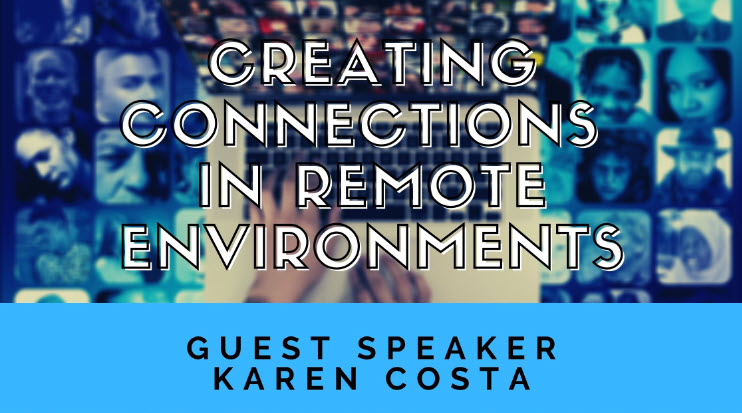Guest Speaker: Karen Costa - Creating Connections in Remote Environments
December 14, 2020 / Diane Marks, PhD, and FGCU Digital Learning Team

The Lucas Center invited Karen Costa, the author of 99 Tips for Creating Simple and Sustainable Educational Videos to join us virtually for an hour-long session about creating connections in remote environments. Ms. Costa did not disappoint! The hour was full of engaging conversation and provided a plethora of diverse resources on the topic.
You can view the video recording of the session until December 25, 2020, at the following:
Access Passcode: @fgcu123
Here are some highlights from our hour with Karen Costa:
- Start where you are
- Connecting with students can be as easy as asking a question about where everyone is learning from. Begin the learning episode with a quick check in that taps into students’ authentic self and emotions. This really resonates with students and makes them feel cared for in your class.
- Community of Inquiry Framework (CoI)
- The Community of Inquiry Framework is certainly the target for high quality online learning experiences. Finding ways to encourage and support Teaching presence, Social presence, and Cognitive presence take deliberate attention to design and pedagogy. If you are interested in learning more about the Community of Inquiry and how to implement strategies that support these three domains, please register for the Online Learning Academy starting in January.
- Prior Knowledge
- It is important to make connections with your students about what they already know. This makes them feel valued and heard in the course. What they know will also surprise you and inform your teaching. Activating prior knowledge can be as easy as posting on a Padlet, posting a cartoon or gif, using emojis or polls to respond to a prompt. If you want to learn more about this technique, please visit the FGCU library and read the e-book, Brain Rules.
- Mutualism
- We often give so much of ourselves to our profession that it is unhealthy and that is not good for us or our students. A healthy balance is best for everyone. Try to get the biggest bang for your buck by using high impact techniques in your online course. If you want to learn more about High Impact Practices Online, please register for the Online Book Club: High Impact Practices in Online Education beginning in February.
- Humanizing
- “Don’t be a robot” is the bottom line here. Demonstrate presence, care, validation, and student agency. Here are some great ways to do this in your online class. If you want to learn more about designing an online course that reflects these elements, please register for the Advanced Online Learning Academy that begins in March.
- Using videos
- Videos are a great way to make connections with students. Alleviate pre-class stress with a welcome video. Help a frustrated student feel better with a tutorial video. Send a weekly video encouraging students to persist and work together.
- Trauma and Stress Awareness
- Students experience high levels of chronic stress at normal times. During COVID-19, stress levels are super high. Times are not normal and you should not try to run your class as if everything is normal. Some strategies for connecting with students during these extraordinary times. FGCU has a wonderful site, Student Care Services, where students in need can find support for the many stressors they face during the Pandemic.
As you can see, Karen Costa Twitter is an expert at blending together theories from different disciplines and giving examples of how they can work in your online classes. She is also a voracious reader and has provided us with a wonderful list of books that dive deeper into these topics. You can find all of these resources on her Google Site: Creating Connections in Remote Environments.
Please contact Bill Reynolds or your Instructional Designer if you have any questions.
